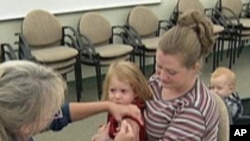<!-- IMAGE -->
A new report about the H1N1 flu virus indicates that the elderly are not immune from the disease afterall. And another report seems to support the early decision to make pregnant women among the first to receive flu vaccinations.
New research in California shows that the general perception that elderly people have some protection from H1N1 virus is only partly true. The study featured this week in The Journal of the American Medical Association says that the virus can infect anyone, including the elderly, although most had prior weakened immune systems or underlying conditions.
Dr. Janice Louie led the study. She looked at more than 1,000 patients hospitalized in California from April to August of this year. "One of the most important messages of this study is that H1N1 infections can be a severe illness even if you don't necessarily have the risk factors for severe complications," she says, "even healthy people can get sick and hospitalized."
The research found that most of the elderly with the H1N1 infection needed hospitalization. And in a sample of patients between 70 and 90 years old, 20 percent died. Most required intensive care and mechanical ventilation. Another new finding tied the flu virus to weight.
"One of the unusual findings we noticed in our study and we noticed this early on and it has been observed by others actually throughout the world, is the high proportion of hospitalized cases who were obese," Dr. Louie said.
<!-- IMAGE -->
Doctors early on decided that pregnant women and children should be among the first to receive vaccinations. And the National Institute of Health says in yet another study that the vaccine does offer good protection to pregnant women.
"The data show that nearly all pregnant women who received a single 15-microgram dose had a robust immune response that is likely predictive of protection," Dr. Anthony Fauci said.
The World Health Organization urges pregnant women to get vaccinated against the virus because infants and pregnant women have a higher risk of becoming very ill or even dying from the H1N1 virus.




